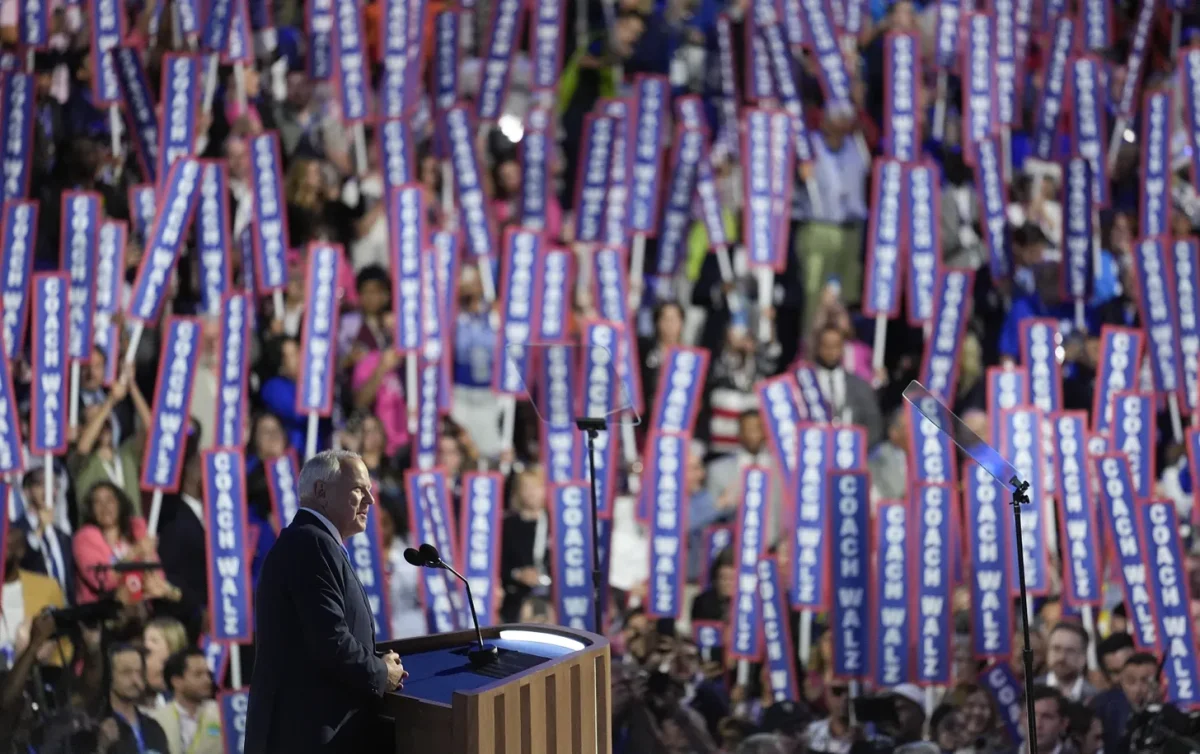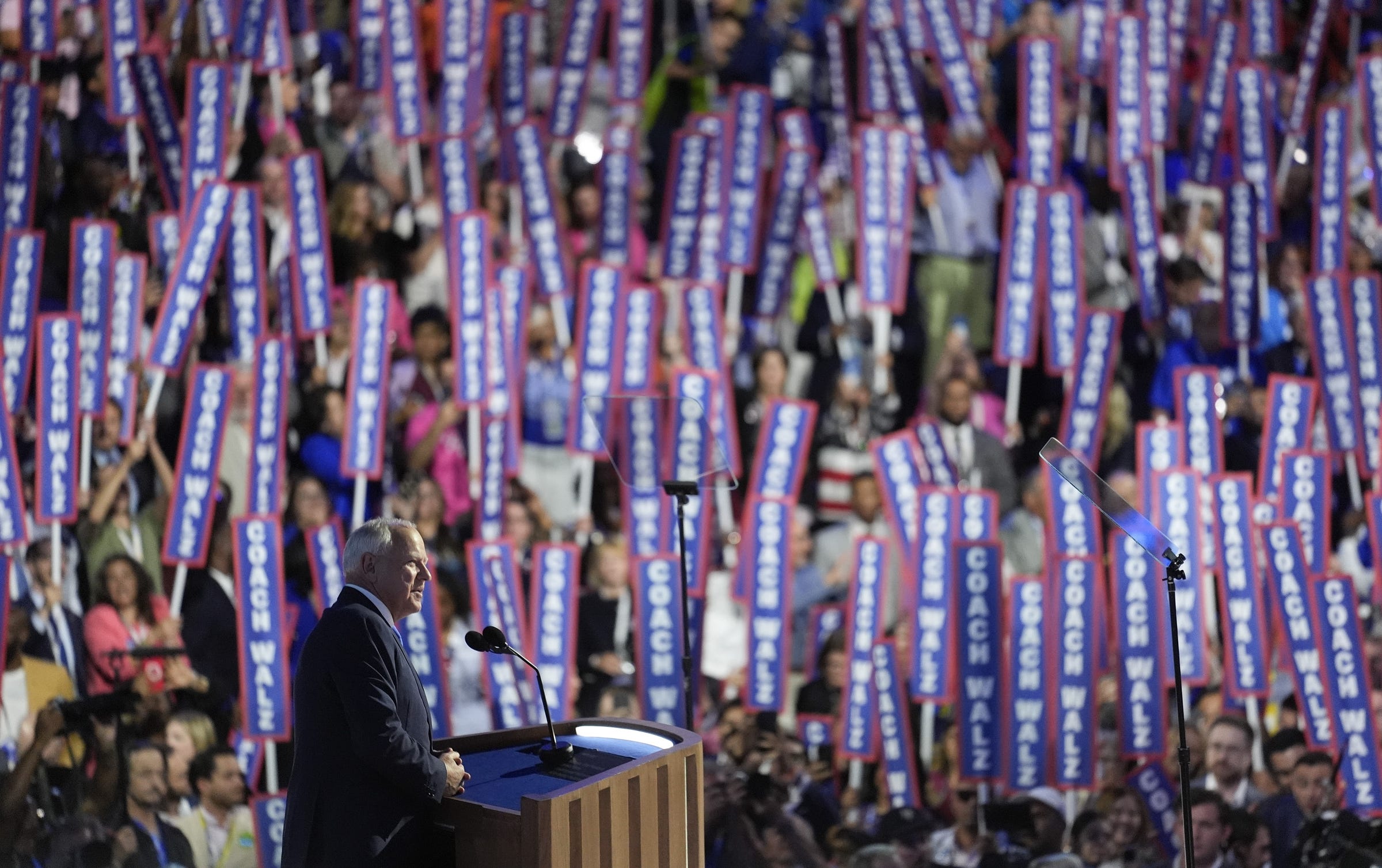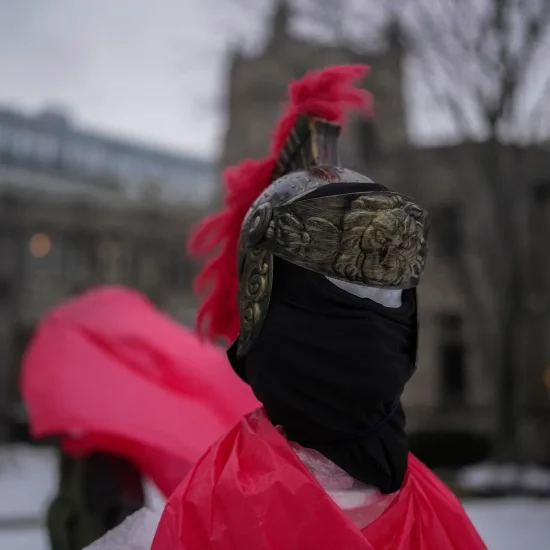
Editors note: The original version of this piece, published at our Substack newsletter “A Public Witness,” includes multiple video clips that are not available here. If you wish to view them alongside the text, you can do so by clicking here.
During the start of the Democratic National Convention in Chicago, Illinois, on Monday (Aug. 19), a Baptist preacher noted the importance of reading the Bible. U.S. Sen. Raphael Warnock, also the longtime pastor of Ebenezer Baptist Church in Atlanta, Georgia, mentioned two viral moments involving Donald Trump and a Bible as Warnock warned people about reelecting someone who is “a plague on the American conscience.”
“And, yes, I saw him, I saw him holding the Bible and endorsing a Bible as if it needed his endorsement. He should try reading it!” Warnock declared to a roar of cheers and applause. “It says, ‘Do justice, love kindness, and walk humbly with your God.’ He should try reading it. It says, ‘Love your neighbor as yourself.’ It says, ‘Inasmuch as you’ve done it unto the least of these, you have done it also unto me.’”
Warnock, whose church’s previous ministers included Martin Luther King Sr. and Jr., also worked in other biblical references during his remarks, though he didn’t always identify them as coming from the Bible. On four occasions he mentioned the importance of working to “heal the land,” a phrase he borrowed from 2 Chronicles 7:14. That verse, popular with those espousing Christian Nationalism, also showed up during the Republican National Convention and is the most-cited verse during prayers at Trump rallies. But Warnock used it differently. He didn’t frame it as a biblical teaching and didn’t cite the part about praying to God, thus invoking the notion for a pluralistic society.
Warnock’s point in quoting verses was first to call out the hypocrisy of a politician posing with Bibles. But the specific verses also fit with his focus on the importance of helping those in need. A bit later in his remarks, Warnock explained how the COVID-19 pandemic proved we are connected and must help each other.
“A contagious, airborne disease means that I have a personal stake in the health of my neighbor. If she’s sick, I might get sick also. Her healthcare is good for my health. I’m just trying to tell you that we are as close in our humanity as a cough. I need my neighbor’s children to be okay so that my children will be okay. I need all of my neighbor’s children to be okay,” he declared. “Because we are all God’s children. And so let’s stand together. Let’s work together. Let’s organize together. Let’s pray together. Let’s stand together. Let’s heal the land.”
Warnock didn’t specifically cite the Bible to make his argument about caring for our neighbors. He literally framed it with an example that anyone could accept regardless of their religious beliefs (other than those whose faith is science denialism). But his example clearly connects to the admonition to “love your neighbor as yourself” that he urged Trump to read. That verse is also connected to the idea of the “Golden Rule.” Although found in numerous religious and ethical contexts, in Christianity the Golden Rule is based on Jesus’s teaching to “do to others what you want them to do to you” and oft-repeated biblical commandment about loving your neighbor as yourself.
While Warnock did not use the phrase the “Golden Rule,” other DNC speakers have. In fact, the most common biblical reference at the DNC this week has been to the idea of following the Golden Rule and loving our neighbors. These references popped up even more than Micah 6:8 (that Warnock quoted), Psalm 30:5 about joy coming in the morning, and Amos 5:24 about letting “justice roll down like water.”

Democratic vice presidential nominee Tim Walz speaks during the Democratic National Convention on Aug. 21, 2024, in Chicago, Illinois. (Matt Rourke/Associated Press)
But the politician who most invokes the Golden Rule in this campaign does so in a unique way. Vice Presidential nominee Tim Walz frequently declares in campaign speeches that the Golden Rule means “mind your own damn business.” Other speakers at the DNC offered a different interpretation of the famous ethical teaching. So for this issue of A Public Witness, I listen unto the DNC speakers as I’d like them to listen unto me.
Mind Your Own Neighbors
On Aug. 6, the day Vice President Kamala Harris announced Minnesota Gov. Tim Walz as her running mate, he joined her for a rally in Pennsylvania. During his remarks, he criticized Republicans for interfering with personal freedoms. He added, “In Minnesota, we respect our neighbors and their personal choices that they make. Even if we wouldn’t make the same choice for ourselves, there’s a Golden Rule: mind your own damn business.” Some in the crowd, to Walz’s delight, started chanting, “Mind your own damn business.” Walz framed his paraphrase of the Golden Rule as what it means to be a good Midwestern neighbor.
A crowd-pleasing line that sparks applause and cheers, Walz has made it a regular reference in his campaign speeches over the past two weeks. Like on Saturday when he returned to Nebraska, the state he grew up in: “In Minnesota, we respect our neighbors and their personal choices. Here in Nebraska, it’s the same way. We might not make those choices for ourselves, but we live by the Golden Rule, and that Golden Rule is mind your own damn business.” Walz also used the line last night in his DNC acceptance speech.
While Walz frames the Golden Rule as leaving people alone, other DNC speakers instead invoked the ideal as inspiration for taking actions to help people with their own business. On Monday night, Kentucky Gov. Andy Beshear mentioned it as he talked about efforts to restrict women’s healthcare and IVF access, which are the same issues for which Walz invokes the Golden Rule.
“How we treat people transcends party lines. It goes right to the heart of who we are,” said Beshear, a deacon in his Disciples of Christ congregation. “My faith teaches me the Golden Rule, that I am to love my neighbor as myself. And the ‘Parable of the Good Samaritan’ says we are all each other’s neighbors.”
On Tuesday, Jimmy Carter’s grandson Jason brought greetings from his grandfather who is looking forward to voting for Harris in November after turning 100 in October. Highlighting the character of his grandfather (a longtime Baptist Sunday School teacher), Jason said, “He and my grandmother led their lives with an unwavering faith in God, a respect for human dignity, honesty, and a commitment to loving their neighbors as themselves. Those principles guided them throughout their lives, including during their four years in the White House and the four decades since.”
While Walz framed the Golden Rule as leaving our neighbors alone, Warnock, Beshear, and Carter all instead highlighted the importance of loving our neighbors and helping them. This contrast was particularly on display on Tuesday about 80 miles from the DNC arena. As delegates gathered for the second night of the DNC, Harris and Walz campaigned in the facility where the Republicans recently held their convention in Milwaukee, Wisconsin. Walz worked in his line about “that Golden Rule.” A short while later, Harris started her remarks, sending greetings livestreamed into the DNC arena in Chicago. After the feed ended, she continued her speech to those at the Wisconsin rally. She eventually paused mid-sentence to request medical attention for someone in the crowd. Rather than minding her own business, Harris intervened.
“This is who we are,” Harris said as she restarted her remarks. “This is what we’re about, looking out for each other. We care about each other. It’s about truly understanding what ‘love thy neighbor’ means. It’s about in the face of a perfect stranger, seeing a neighbor, understanding what that love of each other means.”
Minding our own business or loving our neighbor who might even be a stranger? This difference is more than semantics; it gets to the heart of Jesus’s interpretation of the ethical admonition.
Get cutting-edge analysis and commentary like this in your inbox every week by subscribing today!
All that Glitters is Not Gold
The ideal we’ve called the “Golden Rule” since the 17th century is actually an ancient teaching found in various cultures. Given its name by Anglicans, it’s not an explicitly Christian concept. Similar ideas have been found in writings hundreds of years before Jesus in Egypt, Greece, India, Persia, and elsewhere.
However, those ancient statements generally framed the teaching in a negative sense. Like in Egypt: “That which you hate to be done to you, do not do to another.” Or how the ancient Greek philosopher Isocrates put it: “Do not do to others that which angers you when they do it to you.” Or as Tim Walz puts it, “Mind your own damn business.”
The teaching in the negative sense is important. If people would at least follow that, it would make our society better. The fact that people aren’t even meeting that level of the Golden Rule is part of what makes Walz’s line work in campaign speeches. But Jesus went further, framing it in the positive sense. Like when he summarized the teachings of the law and the prophets as “do to others what you would have them do to you.” This marked a shift from other teachers at the time.
“The Golden Rule was not invented by Jesus; it is found in many forms in highly diverse settings,” evangelical scholar D.A. Carson wrote in his commentary on Matthew. “About AD 20, Rabbi Hillel, challenged by a Gentile to summarize the law in the short time the Gentile could stand on one leg, reportedly responded, ‘What is hateful to you, do not do to anyone else. This is the whole law; all the rest is commentary. Go and learn it.’ Apparently only Jesus phrased the rule positively. Thus stated, it is certainly more telling than its negative counterpart, for it speaks against sins of omission as well as sins of commission.”
Carson added that Hillel’s version would mean the “goats” in Matthew 25 would be acquitted even as they did nothing to help “the least of these.” But Jesus’s version of the Golden Rule indicts not just those who hurt others but also those who don’t help others.
Similarly, the biblical command to love your neighbor as yourself — which is found repeatedly in both testaments — frames our responsibility as a positive affirmation. It’s about what we do for other people, not just what we don’t do to them. In this light, “do not harm” isn’t enough. We’re also supposed to actively work to help our neighbors, just as the “Parable of the Good Samaritan” teaches. With just a negative rendering of the Golden Rule, we cannot condemn the first two people who passed by. But with that parable, Jesus raised the ethical expectations.
That’s where Walz’s “Golden Rule” line falls woefully short. Treating others as we want to be treated sometimes means we get involved in their lives. Loving our neighbors sometimes means we don’t mind our own business. It might mean like the Samaritan in the parable that we stop and help someone. It might mean like the “sheep” in Matthew 25 that we feed the hungry, welcome the stranger, clothe the naked, and visit the imprisoned.
Ironically, the rest of Walz’s DNC speech last night made it clear he doesn’t actually follow such a limited, negative rendering of the Golden Rule. Perhaps more than any other DNC speaker, he emphasized the importance of being a “good neighbor” (a phrase he even used). As he talked about growing up in a small town in Nebraska, he said such communities teach you “how to take care of each other. That family down the road, they may not think like you do, they may not pray like you do, they may not love like you do, but they’re your neighbors and you look out for them and they look out for you.” Later in his speech, he said he ran for Congress with the goal of living out what he tried to teach his students: “A commitment to the common good, an understanding that we’re all in this together, and the belief that a single person can make a real difference for their neighbors.” And he framed his political agenda as one that helps “our neighbors in need.”
Whether you agree with specific proposals or not, Walz frames his life and his politics in a positive version of the Golden Rule. Despite his crowd-pleasing line about minding our own business, he’s actually pushing a vision of actively helping and loving our neighbors. He’s lifting up the importance of seeing people around us as our neighbors and being a good neighbor to them. It’s an attitude and rhetorical focus we need more of in our politics today. I just wish he’d drop that “damn” line.
As a public witness,
Brian Kaylor






